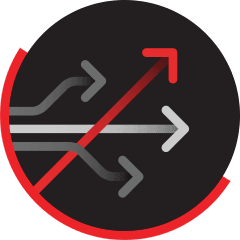Digital transformation was already an important strategic objective before the COVID-19 epidemic. However, the pandemic has acted as a catalyst to accelerate the transformation journey for the majority of the companies.
What was once considered the best-in-class speed of operations for a majority of business cases is now seen as uncompetitively slow. Changes in customer expectations surrounding products and services have accelerated digital transformation.
Digital transformation is an umbrella term - covering the application of new technologies, skills, and procedures to create efficient business operations that satisfy customers. It is about reimagining how a company leverages technology, people, and processes, either through changing existing business processes or creating new business models and income streams.
For many traditional goods-producing companies, this means developing digital products such as mobile apps or e-commerce platforms. Companies have been on digital transformation journeys for several years to combat the threat of disruption from incumbents and startups, but progress after the pandemic has been incredibly fast.
For faster and safer delivery, retailers like Walmart and Bed Bath & Beyond shook up store operations by switching to curbside delivery and other contactless options. Meanwhile, IT professionals re-prioritized their strategic IT roadmaps, with many embracing cloud software for video collaboration and installing machine learning (ML) software to help companies monitor how items move through supply chains.
Such solutions do not facilitate transformation on a point-by-point basis. Rather, the way these tools and other solutions are woven into a company's digital health — and reflect its business priorities — provides a clearer picture of its digital fitness.
There are a few ways to accelerate your digital transformation journey and stay ahead of the competition:
- Reimagining your services.
- Creating distinctive customer experiences.
- Redefine new business and revenue models.
- Rectify and resolve issues as soon as possible.
For the past decade, Sonata Software has been assisting enterprises in accelerating their digital transformation journey through our proprietary PlatformationTM methodology.
PlatformationTM is a methodology for creating powerful digital platforms that are connected, open, scalable, and intelligent. Sonata leverages this methodology to help companies develop a sharp digital transformation strategy and build platforms that drive their business growth in this phygital world. Sonata Software helps in unlocking value and growth through platforms and shapes the digital agenda with the help of platform-led thinking.
Sonata Software's PlatformationTM approach guides an organization through the entire platform adoption process, from defining its vision to selecting an appropriate strategy and implementing its platform adoption roadmap.
PlatformationTM consisted of five steps:
Strategy and Operations
The first step's major goal is to design an acceptable strategy based on the company's context, needs, and business goals. Businesses could also choose an appropriate platform type that could serve as a model for their envisioned platform. An organization may grasp the expected value as well as the dangers of embarking on the platformation journey by outlining the platform plan in advance.
Maturity Assessment
Understanding and capturing the organization's existing position in terms of business and technology readiness to commence Platformation™ is a fundamental goal of the second step in the process. Corporate and technology readiness assessments assist business leaders in better understanding the existing situation and developing pragmatic strategies based on the time and resources required to transform technology areas and business areas.
Business Architecture
In order to fulfill the platform's goal of developing a connected, intelligent, open, and scalable platform, company leaders can use the platform's business architecture to reorganize or even restructure business operations and key interactions among platform members.
Technology Architecture
Business executives can establish an execution roadmap and plan for the Platformation™ journey by defining priorities across available technology techniques and potential future designs.
Realization
Business executives can align with the organization's platformation strategy and goals by establishing the platform realization approach and laying out the development and execution roadmap by defining key releases, teams, and launch strategies.
FAQs
What is digital transformation?
Digital transformation is the process of reimagining and reinventing business operations, roles, and technology-driven by crafting unique user journeys to cater to the expectations of customers. This is done by linking all business processes to a connected ecosystem where customer experience is the core.
What are the benefits of digital transformation?
There are various benefits of digital transformation. Some of them are listed below:
- Improved data collection
- Effective resource management
- Advanced insights
- Unique customer experiences
- Improved collaboration
- A better revenue model
- Brings agility
- Enhance productivity
What is the impact of digital transformation on your business?
A good digital marketing strategy can impact your business in many ways.
- Increased revenue
- Low operating cost
- Better customer satisfaction
- Customer loyalty
- Lowered fragmentation
Sonata Software specializes in building platforms and frameworks to accelerate your digital transformation journey. Watch out for this space for more updates. Worried about your digital transformation journey? Reach out to us today and, we will show you the way forward.

